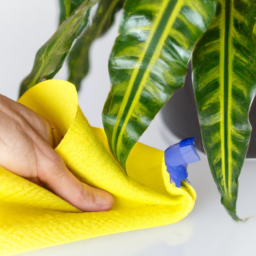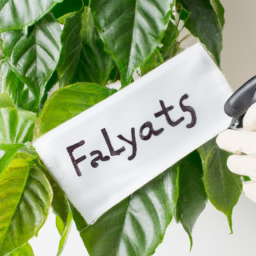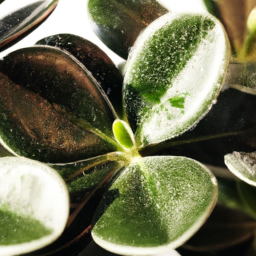
Are you tired of using harsh chemicals to clean your home? Looking for a more eco-friendly alternative that is both effective and safe? Look no further! In this blog post, we will explore the wonderful world of eco-friendly cleaning with plants. Yes, you heard it right! Plants can be used as natural cleaning agents, providing a healthier and greener option for maintaining a clean and fresh living space. So, if you’re ready to embrace a more sustainable approach to cleaning, keep reading to discover the power of eco-friendly cleaning with plants.
Eco-Friendly Cleaning with Plants
Benefits of Using Plants for Eco-Friendly Cleaning
When it comes to cleaning our homes, many of us turn to commercial cleaning products that contain harmful chemicals. However, there is a natural and eco-friendly alternative that not only cleans effectively but also provides numerous benefits for our health and the environment. Using plants for eco-friendly cleaning is a growing trend that offers a range of advantages. Let’s explore some of the key benefits of incorporating plants into your cleaning routine.
Natural Air Purification
One of the most significant benefits of using plants for eco-friendly cleaning is their ability to naturally purify the air in our homes. Indoor air pollution is a major concern, with various chemicals and pollutants released by synthetic cleaning products, furniture, and even the air fresheners we use. Plants act as natural air filters, absorbing these toxins and releasing fresh oxygen into the environment.
Plants such as the Boston Fern, Peace Lily, and Spider Plant are particularly effective in removing harmful chemicals like formaldehyde, benzene, and xylene from the air. By incorporating these plants into your cleaning routine, you can create a healthier and cleaner indoor environment for you and your family.
Furthermore, the presence of plants can also help to reduce common indoor pollutants like dust, mold spores, and bacteria, improving overall air quality and reducing the risk of respiratory issues.
Chemical-Free Cleaning Solutions
Another significant advantage of eco-friendly cleaning with plants is the elimination of harmful chemicals from your cleaning routine. Traditional cleaning products often contain harsh chemicals that can irritate the skin, eyes, and respiratory system. By using plant-based cleaning solutions, you can avoid these health risks and create a safer environment for yourself and your loved ones.
Plants like aloe vera, lavender, and mint possess natural cleaning properties. Aloe vera gel can be used as a gentle and effective all-purpose cleaner, while lavender and mint essential oils can be added to homemade cleaning solutions for their antimicrobial and freshening properties.
Additionally, plants like lemon balm, rosemary, and thyme can be used to make natural disinfectants. These plants contain compounds with powerful antibacterial properties, making them excellent alternatives to chemical-laden disinfectant sprays.
Enhanced Mood and Well-being
Incorporating plants into your cleaning routine not only benefits your physical health but also positively impacts your mental well-being. Studies have shown that being surrounded by nature, even indoors, can reduce stress, improve mood, and increase productivity.
The presence of plants in your home can create a calming and soothing atmosphere, helping to alleviate anxiety and promote relaxation. Cleaning with plants allows you to connect with nature and experience the therapeutic effects of greenery while completing your household chores.
Furthermore, plants have been found to increase humidity levels in indoor spaces, which can help combat dryness and improve respiratory health. This is especially beneficial during the winter months when heating systems tend to dry out the air.
By incorporating plants into your cleaning routine, you not only create a healthier and safer environment but also enhance your overall well-being and quality of life.
Conclusion
In conclusion, using plants for eco-friendly cleaning offers numerous benefits for both our health and the environment. From natural air purification to chemical-free cleaning solutions and enhanced mood and well-being, incorporating plants into your cleaning routine is a win-win situation.
So, why not give it a try? Start by introducing some air-purifying plants into your home, such as the Boston Fern or Peace Lily. Explore natural cleaning solutions using plant-based ingredients like aloe vera, lavender, and mint. Experience the refreshing and therapeutic effects of cleaning with plants while making a positive impact on your health and the planet.

Best Plants for Natural Cleaning Solutions
Keeping our homes clean and free from harmful chemicals is not only beneficial for our health but also for the environment. One way to achieve this is by incorporating eco-friendly cleaning practices using plants. Plants have natural properties that can help us maintain a clean and fresh living space. In this article, we will explore some of the best plants for natural cleaning solutions.
Lemon Balm
Lemon balm, also known as Melissa officinalis, is a versatile plant that offers numerous benefits for eco-friendly cleaning. Its strong lemon scent can naturally freshen up any room, making it an excellent choice for air purification. You can either place lemon balm leaves in a bowl or make a homemade air freshener by mixing lemon balm essential oil with water.
Additionally, lemon balm has antimicrobial properties that can help in disinfecting surfaces. You can create a simple all-purpose cleaner by infusing lemon balm leaves in vinegar for a few weeks. Strain the mixture and transfer it to a spray bottle. This natural cleaner can be used on countertops, windows, and other surfaces.
Moreover, lemon balm can repel insects, making it an effective natural alternative to chemical-laden insecticides. Planting lemon balm around your home or using its essential oil in a diffuser can help keep pests at bay.
Lavender
Lavender, with its beautiful purple flowers and calming scent, is not only pleasing to the eye but also a powerful plant for natural cleaning solutions. Its aromatic properties make it an excellent choice for freshening up fabrics, such as curtains, carpets, and linens. You can create a homemade linen spray by combining lavender essential oil with water and a small amount of alcohol.
In addition to its fragrance, lavender has antifungal and antibacterial properties. This makes it a valuable plant for cleaning bathrooms and kitchens. You can make a lavender-infused vinegar cleaner by combining lavender flowers with white vinegar. Let the mixture sit for a couple of weeks, strain, and use it to clean various surfaces in your home.
Furthermore, lavender can help repel moths and other insects that often invade our closets. Placing lavender sachets or dried lavender flowers in your wardrobe can keep your clothes fresh and free from unwanted pests.
Aloe Vera
Aloe vera, known for its soothing properties, is not only great for skincare but also a beneficial plant for eco-friendly cleaning. Its gel-like substance contains enzymes that can effectively remove stains from fabrics. You can use aloe vera gel directly on stains or create a homemade stain remover by mixing it with a small amount of liquid soap and water.
In addition to its stain-removing abilities, aloe vera can purify the air by absorbing harmful chemicals commonly found in cleaning products. Place an aloe vera plant in your living room or bedroom to enjoy cleaner and fresher air.
Moreover, aloe vera can be used to make a natural hand sanitizer. Mix aloe vera gel with a few drops of tea tree essential oil for its antimicrobial properties, and you’ll have a gentle and effective hand sanitizer without the need for harsh chemicals.
These are just a few examples of the best plants for natural cleaning solutions. By incorporating these plants into your cleaning routine, you can create a healthier and more sustainable living environment while reducing your reliance on chemical-based cleaning products. Embrace the power of nature and enjoy the benefits of eco-friendly cleaning with plants!

Tips for Incorporating Eco-Friendly Cleaning with Plants in Your Home
Keeping your home clean and fresh doesn’t have to mean relying on harsh chemicals and synthetic cleaners. In fact, you can achieve a sparkling clean home while also being environmentally friendly by incorporating eco-friendly cleaning with plants. Plants not only add beauty and freshness to your living space but can also act as natural air purifiers and cleaning agents. In this article, we will explore some tips on how to incorporate eco-friendly cleaning with plants in your home.
Choosing the Right Plants
The first step in incorporating eco-friendly cleaning with plants is to choose the right ones that are known for their cleaning properties. Here are a few plants that are excellent natural cleaners:
Aloe Vera: Aloe vera is not only great for soothing sunburns, but it also helps to purify the air by removing harmful chemicals found in cleaning products. It is easy to care for and can be placed in any room.
Snake Plant: The snake plant, also known as mother-in-law’s tongue, is a popular choice for its ability to absorb toxins and release oxygen at night. It is perfect for bedrooms and living rooms.
Spider Plant: Spider plants are known for their air-purifying abilities. They can effectively remove formaldehyde and carbon monoxide from the air. Place them in areas with high traffic or near sources of pollution, such as the kitchen.
These are just a few examples, but there are many other plants that can help improve indoor air quality and act as natural cleaners. Research and choose plants that suit your home’s environment and your preferences.
Using Plants for Cleaning
Once you have selected the right plants, you can start using them for cleaning purposes. Here are a few ways to incorporate plants into your cleaning routine:
Natural Air Fresheners: Instead of using synthetic air fresheners that contain harmful chemicals, place pots of fragrant plants like lavender, mint, or jasmine around your home. These plants not only add a pleasant aroma but also help purify the air.
Plant-Based Cleaning Solutions: You can create your own plant-based cleaning solutions using ingredients like vinegar, lemon juice, and essential oils. For example, mix equal parts of water and vinegar to create an all-purpose cleaner. Add a few drops of lemon essential oil for a refreshing scent.
Plant Leaf Dusting: Use large plant leaves, like those of a monstera or a philodendron, to dust surfaces in your home. The leaves’ natural stickiness will attract and hold onto dust particles, making it easier to clean.
These are just a few examples of how you can incorporate plants into your cleaning routine. Get creative and find ways to use plants as natural cleaning tools in your home.
Maintaining and Caring for Plants
Lastly, it’s important to maintain and care for your plants to ensure they continue to thrive and serve their cleaning purposes effectively. Here are some tips for plant care:
Watering: Each plant has different watering needs, so make sure to research and understand the specific requirements of the plants you have chosen. Overwatering or underwatering can harm the plants and their ability to clean the air.
Lighting: Most plants used for cleaning purposes prefer bright, indirect light. Find suitable spots in your home where they can receive adequate sunlight without being exposed to harsh direct light.
Pruning: Regularly prune your plants to remove dead leaves and encourage new growth. This will keep them healthy and vibrant, ensuring their cleaning properties are at their best.
Fertilizing: Use organic fertilizers to nourish your plants and promote their overall health. Avoid synthetic fertilizers that can be harmful to both the plants and the environment.
By properly caring for your plants, you can maximize their cleaning potential and enjoy a healthier living environment.
In conclusion, incorporating eco-friendly cleaning with plants in your home is a wonderful way to maintain a clean and fresh living space while also being environmentally conscious. Choose the right plants, utilize them for cleaning purposes, and provide proper care to ensure their effectiveness. By doing so, you can create a healthier and more sustainable home for you and your family.
Summary Snapshot
Cleaning is an essential part of our daily routine, but have you ever considered the environmental impact of the cleaning products we use? Many conventional cleaning products contain harmful chemicals that can be detrimental to our health and the environment. Luckily, there is a natural and eco-friendly alternative – cleaning with plants!
Plants have been used for centuries for their medicinal properties, and it turns out they can also be powerful cleaning agents. Certain plants, such as aloe vera, lavender, and eucalyptus, have natural antibacterial and antifungal properties that make them effective in cleaning and disinfecting our homes. You can easily create your own plant-based cleaning solutions by infusing these plants in water or vinegar. Not only are these solutions safe for you and your family, but they are also biodegradable, meaning they won’t harm the environment when washed down the drain. Plus, they often leave a pleasant natural scent behind, unlike the artificial fragrances found in commercial cleaning products. So, why not give eco-friendly cleaning with plants a try and make your home a healthier and greener place?
Here are some questions from our readers:
Q1: What is eco-friendly cleaning with plants?
A1: Eco-friendly cleaning with plants refers to using natural, plant-based ingredients and methods to clean and maintain a clean living environment. It involves avoiding harsh chemicals and synthetic cleaners and instead opting for plant-based alternatives that are better for both our health and the environment.
Q2: Why should I consider eco-friendly cleaning with plants?
A2: There are several reasons to consider eco-friendly cleaning with plants. Firstly, plant-based cleaning products are generally safer for your health as they don’t contain harmful chemicals that can cause respiratory issues or skin irritations. Additionally, these products are biodegradable, meaning they break down naturally and don’t contribute to pollution or harm aquatic life when they enter our water systems. Lastly, by using plant-based cleaners, you reduce your carbon footprint and contribute to a more sustainable future.
Q3: What are some common plant-based ingredients used in eco-friendly cleaning?
A3: There are several common plant-based ingredients used in eco-friendly cleaning. Some popular ones include vinegar, lemon juice, baking soda, essential oils (such as tea tree oil or lavender oil), and plant-based soaps. These ingredients have natural cleaning properties and can effectively remove dirt, grime, and stains without the need for harsh chemicals.
Q4: How do I make my own eco-friendly cleaning products with plants?
A4: Making your own eco-friendly cleaning products with plants is relatively simple. For example, you can create an all-purpose cleaner by mixing equal parts water and vinegar, then adding a few drops of your favorite essential oil for a pleasant scent. Baking soda can also be used as a natural scrubbing agent for tougher stains. There are numerous online resources and recipes available that provide step-by-step instructions for creating various plant-based cleaning solutions.
Q5: Where can I find eco-friendly cleaning products with plants?
A5: Eco-friendly cleaning products with plants can be found in various places. Many grocery stores now carry a range of eco-friendly cleaning brands that offer plant-based alternatives. Additionally, online retailers and specialty stores dedicated to sustainable living often have a wide selection of eco-friendly cleaning products. It’s also worth exploring local farmers’ markets or community events where you may find homemade, plant-based cleaning products made by local artisans.
Dr. Olivia Green is a botanist with over two decades of experience in indoor plant cultivation. She holds a Ph.D. in Plant Biology and has dedicated her career to researching plant behavior in controlled environments. Dr. Green is passionate about helping plant enthusiasts master the art of indoor gardening through her extensive knowledge and practical insights.


